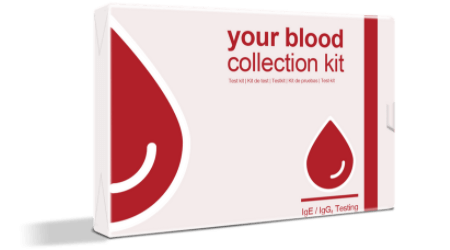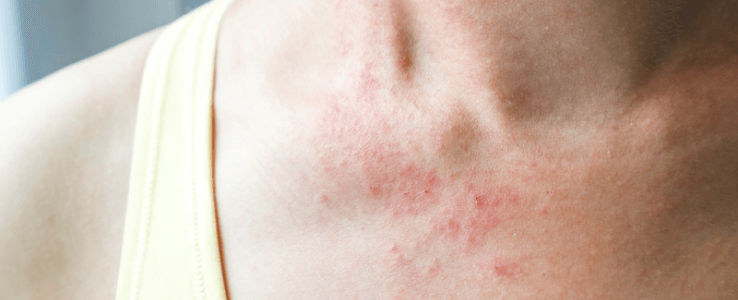When winter is over, many people struggle with pollen allergies every year. Seasonal allergies cause a response like itchy, watery eyes and sneezing and can also include eczema as a symptom. Allergies defined as “seasonal allergies” are named so because once the season is over, those suffering from specific pollen allergies are relieved since this means they’ll no longer suffer from those tedious symptoms anymore. Seasonal allergies include tree pollen (March and April), grass pollen (June and July), ragweed and mould (Autumn). These types of pollen are the causes of seasonal allergies.
On the other hand, eczema is a condition that causes patches of the skin to become inflamed, cracked, itchy, and rough. The main symptom of atopic dermatitis is a rash that will most likely appear on the arms and behind the knees. However, these can occur anywhere. This condition is also known as atopic dermatitis and usually develops in early childhood but is more common in people with a history of this condition.
What allergies trigger eczema?
Even though many factors cause atopic eczema, pollen is among these factors. Other factors include:
- Heat
- Pet dander
- Food allergies
- Stress
- Dust mites
- Chemical irritants
- Scratchy fabric
- Dry skin
- Infections
In the case of allergies, skin contact with a specific allergen can cause a reaction within 48 to 72 hours after the initial contact. So, if you’re allergic to particular pollen, you may frequently see your eczema flaring up during pollen season. Atopic skin tends to be more fragile than normal skin, and when these eczema-triggering factors penetrate the skin surface, it triggers those red itchy patches.
Even though pollen can trigger eczema, it’s not everyone’s trigger. Pollen is just among the many eczema triggers that exist. That’s why when you notice your eczema is flaring up often, it’s best to get an Allergy Test so you may know what’s causing this.
Seasonal allergies, eczema, asthma and hay fever
People suffering from atopic dermatitis (eczema) are at a higher risk of developing pollen allergy, especially children. Although not everyone with eczema develops this allergy, most do. However, when you develop an allergy, it does show symptoms affecting the nose, respiratory system, and eyes. Atopic eczema, asthma, and hay fever are varying manifestations of the same condition; atopy. Unfortunately, some people with atopy experience all three conditions simultaneously or alternatively. Others will experience one or two of these conditions over the course of their life.
The first appearance of eczema, asthma, and then rhinitis is known as Atopic March. Atopic March refers to the fact that atopy begins in a predictable progression in many cases. Starting with eczema manifestation in the first six months of life, followed by asthma between ages 2-4, and then rhinoconjunctivitis. According to a study in China, adult eczema, asthma, and hay fever are prevalent during high pollen seasons, which brings in the link between these conditions and seasonal allergies {1}.
How to avoid eczema during allergy season
Avoiding pollen may be a great way to relieve eczema, especially when combined with a cleansing skincare routine. Avoidance is essential if you suffer from rhinitis and or atopic asthma. However, complete avoidance is difficult since pollen is light and gets carried by the wind. However, you can limit pollen in your immediate proximity by:
- Maintaining your lawn to prevent flowering grass
- Avoid planting trees around your home with potential allergens, like birch trees.
The above tips can either work or not, depending on where you live and work. More suggestions or help in your immediate environment include:
- Avoid going outside when pollen counts are high. Especially mid-morning and early afternoon.
- If you must let in the fresh air, ensure it’s early in the morning before there is pollen in the air.
- Always close your house and car windows.
- Wear glasses and a dust mask to reduce the pollen you breathe in during peak seasons.
- Stay away from going for a walk when the weather is dry, sunny, or windy during the pollen season.
- If you’ve been outside, take a bath, wash your hair and change clothes when you get home.
- Only hang clothes to dry inside.
Seasonal allergies testing
Since there are many allergens taking rounds in various seasons, it’s best to know the specific one that’s affecting you rather than treating it without finding the root cause. You can do this by taking an Allergy Test. Even though seasonal allergies can cause symptoms like eczema and make your life miserable, other factors like perennial allergies and food allergies could cause eczema. Unlike seasonal allergies, food and perennial allergies will always be around and can make you miserable. Taking an allergy test when you feel like your eczema is being flared up by external factors (which it often is) will help you manage that factor and stay symptoms free. Even though an allergy test won’t cure your eczema, it will help you confirm a diagnosis to avoid it.
How to treat eczema
There are topical creams that your doctor can recommend which will alleviate inflammation. However, taking antihistamines can help with asthma and allergic rhinitis associated with eczema. Antihistamines with a sedative effect can help improve sleep for those who feel restless because of eczema. An important way to deal with eczema is by moisturising frequently to avoid dry skin. If you have food allergies that trigger eczema, avoiding those foods in your diet will help you prevent these symptoms.
Final thoughts on eczema and seasonal allergies
Eczema and seasonal allergies are related. However, not all eczema is a result of allergies. When you’re suffering from atopic dermatitis, allergies are just one of the triggers, alongside stress, dry skin, irritants, infections, and other factors. People suffering from eczema already have a damaged skin barrier which means their skin is often dry and more sensitive to bacteria, allergens, and irritants. Moisturising your skin is one of the best ways to control eczema. If you haven’t tested for allergies, get your Allergy Test today. This test will help you realise allergens your immune system is reacting to in your food, environment, and drink. Once you have your results, always remember that avoiding whatever triggers your allergies could help prevent those famous eczema flare-ups.
References
- Wang, X., Zhuang, Y., Chen, Y., Wang, H., & Wang, X. (2021). Prevalence of adult eczema, hay fever, and asthma, and associated risk factors: a population-based study in the northern Grassland of China. Allergy, asthma, and clinical immunology: official journal of the Canadian Society of Allergy and Clinical Immunology, 17(1), 27. https://doi.org/10.1186/s13223-021-00532-7



